The last great Cossack riot. Rise of Emelyan Pugachev
1. The discontent of the Volga peoples with national and religious oppression, as well as the arbitrariness of the tsarist authorities, increased. All sorts of obstacles were repaired for traditional folk religion and in the activities of imams, mullahs, mosques and madrasas, and part of the indigenous population was imprudently subjected to violent Christianization. In the South Urals, on the lands purchased for a song from the Bashkirs, entrepreneurs built steel works, hired Bashkirs for auxiliary works for pennies. Salt industry, river and lake shores, forest cottages and pastures were taken from the indigenous population. Huge tracts of impassable forest were rapaciously cut down or burned to produce coal.
2. In the second half of the 18th century, the feudal oppression of the peasants increased. After the death of Tsar Peter in Russia, a long period of "Indian rule" began, and the empresses distributed to landowners, including their numerous favorites, hundreds of thousands of state-owned peasants. As a result, every second peasant of Great Russia became a serf. In an effort to increase the profitability of estates, landlords increased the size of the corvee, their rights became unlimited. They could screw up a person to death, buy, sell, exchange, send in soldiers. In addition, a powerful moral factor of class injustice superimposed on life. The fact is that on February 18 of 1762, Emperor Peter III adopted a decree on the liberty of the nobility, granting the right to the ruling class of their choice to either serve the state or resign and leave for their estates. Since ancient times, the people, in its different estates, had a firm conviction that each estate, to the best of its abilities and abilities, serves the state for the sake of its prosperity and national welfare. Boyars and nobles serve in the army and institutions, the peasants work on the land, in their estates and noble estates, workers and craftsmen - in workshops, factories, Cossacks - on the border. And then the whole estate was given the right to laze around, lie down on the couches for years, get drunk, pervert, and eat free bread. This inactivity, uselessness, idleness and the depraved life of the rich nobles especially annoyed and oppressed the working peasantry. The matter was aggravated by the fact that retired nobles began to spend most of their lives on their estates. Formerly, they spent most of their life and time in the service, and the heads of their own local peasants actually managed the estates. The nobles retired after 25 years of service, in mature years, often sick and wounded, wise with many years of service, knowledge and everyday experience. Now young and healthy people of both sexes were literally languishing and toiling from idleness, inventing new, often depraved, entertainments that demanded more and more money. In gusts of unbridled greed, many landowners took land from the peasants, forcing them to work in the serfdom all week. The peasants, with their gut and intelligence, understood that the ruling circles, freeing themselves from service and labor, increasingly tightened the fortress and oppressed the laboring, but powerless peasantry. Therefore, and sought to restore a fair, in their opinion, past way of life, to force presumptuous nobles to serve the Fatherland.
3. There was also great dissatisfaction among mining and industrial workers with hard, hard labor and poor living conditions. The serfs were attributed to state factories. Their labor at the plant was counted as a working off the corvee. Means for feeding these peasants were to receive from their subsidiary farms. Pripisnyh were forced to work in factories up to 260 days a year, they had little time to work in their farmsteads. Their farms were poorer and depleted, and people lived in extreme poverty. The "merchant" owners in the 40-ies were also allowed to "export all sorts of bureaucrats of people" to the Ural factories. Only the breeder Tverdyshev to the 60-years of the XVIII century for their factories acquired over 6 thousands of peasants.
Breeders-feudal slaves forced to work out a "lesson" not only for themselves, but also for the dead, the sick, the runaway peasants, for the elderly and children. In a word, labor duties increased many times over and people could not get out of life-long heavy bondage. Along with bonded and serfs in the workshops worked hard, skilled and runaway ("descent") people. For each runaway soul hired, the owner paid 50 rubles to the treasury and owned it for life.
4. Cossacks were also dissatisfied. Yaik Cossacks since ancient times were famous for their freedom, stamina in the old faith and traditions bequeathed by their ancestors. After the defeat of the Bulavinsky uprising, Peter I tried to limit Cossack liberties on Yaik, disperse the Old Believers and shave Cossacks beard, and received appropriate protest and opposition that lasted several decades, survived the emperor himself, and later spawned powerful uprisings. Since 1717, the Yaik Atamans have ceased to be selected, and continuous complaints and denunciations of Atamans appointed by the king began to be appointed and to St. Petersburg. Verification commissions were appointed from St. Petersburg, which with varying degrees of success extinguished dissatisfaction, and partly, due to the corruption of the commissioners themselves, aggravated it. The confrontation of state power and Yaikovsky troops in the 1717-1760 years grew into a protracted conflict, during which the Yaik Cossacks delimited the "consonants" of atamans and foremen and "dissenters" of ordinary military Cossacks. The following case overflowed with patience. Since 1752, the Yaik army, after a long struggle with the merchant clan of the Guryevs, has acquired rich fisheries in the lower reaches of the Yaik. Ataman Borodin and foremen used profitable fishing for their own enrichment. Cossacks wrote complaints, but they were not allowed to go. In 1763, the Cossacks sent a complaint with walkers. Ataman Borodin was removed from his post, but the trooper, a military foreman Loginov, was accused of slander and exiled to Tobolsk, and 40 Cossack signatories were punished with whips and sent from Yaitsky town. But this did not humble the Cossacks, and they sent a new delegation to St. Petersburg led by Centor Portnov. The delegates were arrested and sent under escort to Yaik. A new commission headed by General von Traubenberg arrived there. This foreigner and bourbon began his activity by dug out seven elected respected Cossacks, shaved off their beards and sent them under escort to Orenburg. This greatly outraged the freedom-loving villagers. On January 12, authoritative Cossacks Perfilyev and Shagayev assembled a Circle and a huge mass of Cossacks went to the house where the fierce general was located. Old men, women and a priest walked in front of the icons, they carried a petition, sang psalms and wanted the world to solve controversial but important issues. But they were met by soldiers with guns and gunners with guns. When the Cossack mass came to the square in front of the Military Hut, Baron von Traubenberg ordered to open fire from cannons and guns. As a result of dagger fire, more than 100 people died, some rushed to flee, but most of the Cossacks, defying death, rushed to the cannons and killed their gunners with their bare hands. The guns were deployed and the punitive soldiers were shot at close range. General Traubenberg was hacked up with swords, the captain Durnovo was beaten, the chieftain and the foremen were hanged. They immediately elected a new chieftain, foremen and Krug. But a detachment of punishers arrived from Orenburg, led by General Freiman, abolished the new government, and then carried out the decision arrived from St. Petersburg on the case of the rebellious Cossacks. All participants were expelled, besides 16 Cossacks pulled out their nostrils, burned the thief stamp on their faces and sent to penal servitude in Siberia, 38 Cossacks with their families were sent to Siberia, 25 sent to soldiers. For the rest, they imposed a huge contribution - 36765 rubles.
5. Some historians do not deny the "Crimean-Turkish trace" in the Pugachev events, some facts from Pugachev’s biography also indicate this. But Emelyan himself did not recognize the connection with the Turks and Crimeans, even under torture.
All this engendered keen discontent with the authorities, prompted to seek a way out in active protest and resistance. Only the instigators and leaders of the movement were needed. The instigators appeared in the face of the Yaik Cossacks, and Yemelian Ivanovich Pugachev became the leader of the powerful Cossack-peasant uprising.
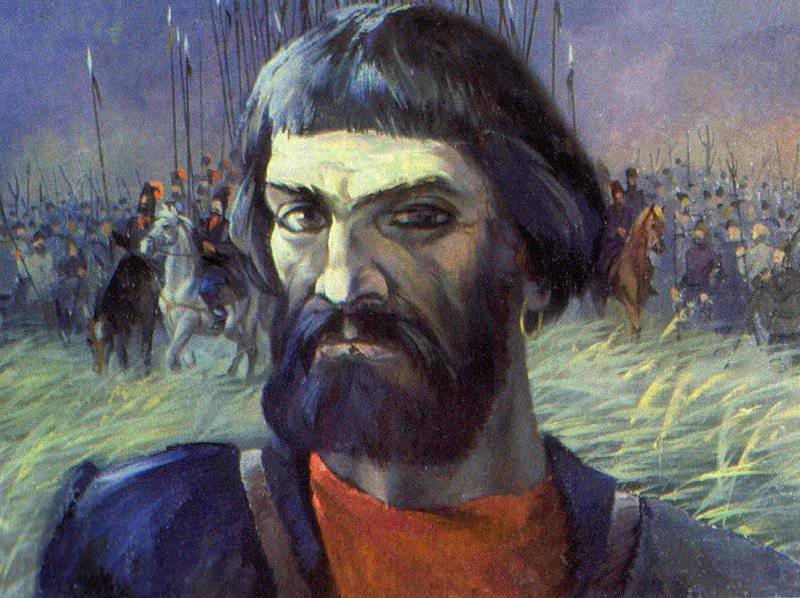
Fig. 1. Emelyan Pugachev
Pugachev was born on Don, in 1742, in the village of Zimoveyskaya, the same one where the rebellious ataman S.T. Razin. His father came from simple Cossacks. Until 17 years Emelya lived in the family of his father, being engaged in the economy, and after his resignation took his place in the regiment. In 19 years he married, and soon went with a regiment in the campaign in Poland and Prussia and participated in the Seven Years War. For his promptness and quickness of mind, he is appointed adjutant of the regimental commander I.F. Denisov. In the 1768 year, he goes to war with Turkey, for the difference with the capture of the fortress Bender receives the rank of cornet. But a serious illness causes him to leave the army in 1771, the report says: "... and his chest and legs rot." Pugachev is trying to retire due to illness, but receives a refusal. In December 1771, he secretly runs to the Terek. Before the Terek ataman Pavel Tatarnikov, he is represented as a voluntary settler and is assigned to the village of Ischorskaya, where he is soon elected as the village ataman. The Cossacks of the villages of Ischorskaya, Naurskaya and Golugaevskaya decide to send him to St. Petersburg to the Military Collegium with a request for an increase in salary and provisions. After receiving 20 rubles of money and stanitsa printing, he goes to the light village (business trip). However, in St. Petersburg he was arrested and imprisoned in the guardhouse. But along with the guard soldier he runs out of custody and comes to his homeland. There he is again arrested and escorted to Cherkassk. But with the help of his colleague in the Seven Years War, he again runs and hides in Ukraine. With a group of local residents he goes to the Kuban to the Nekrasov Cossacks. In November, 1772, he arrived in the town of Yaitsky and personally saw the tension and anxiety of the Yaik Cossacks in anticipation of reprisals for the murdered tsarist chaser, General von Traubenberg. In one of the conversations with the master of the house, the old-cossack cossack D. I. Pyankov, Emelyan disguises himself as Emperor Peter III Fedorovich, and he shared an incredible news with friends. But according to the denunciation, Pugachev was arrested, beaten with batogs, shackled and sent to Simbirsk, then to Kazan. But from there he runs and wanders around the Don, the Urals and in other lands. It’s a real Cossack Rambo or Ninja. Long wanderings embittered him and taught him a lot. He witnessed with his own eyes the hard life of the oppressed people, and a thought arose in a lush Cossack head to help disfranchised people find their desired freedom and heal in Cossack peace, widely, voluntarily and in great prosperity. When he arrived in the Urals again, he already appeared before the Cossacks as “sovereign Peter III Fedorovich,” and under his name began to issue manifestos promising wide freedoms and material benefits to all disgruntled. Written by an illiterate, but lively, imaginative and accessible language, the Pugachev Manifests were, in a fair expression, A.S. Pushkin, "an amazing example of popular eloquence." For many years, in the vast expanses of Mother Russia, the legend of the miraculous salvation of Emperor Peter III and dozens of such impostors walked around at that time, but Pugachev turned out to be the most extraordinary and successful. And the people supported the impostor. Of course, he confessed to his closest associates D. Karavaev, M. Shigaev, I. Zarubin, I. Ushakov, D. Lysov, I. Pochitalin that he took the name of the king to influence ordinary people, so it was easier to raise them to the uprising, and he is a simple Cossack. But Yaik Cossacks were in dire need of an authoritative and skillful leader, under whose banner and leadership they would stand up to fight with self-serving and masterful boyars, officials and cruel generals. In fact, not many people believed that Pugachev was Peter III, but many followed him, such was the thirst for rebellion. On the farm of the Tolkachev brothers, located 100 versts from Yaik town, September 17 1773 arrived around 60 Cossacks. Pugachev addressed them with a fiery speech and "royal manifesto" written by Ivan Pochitalin. With this small detachment, Pugachev set off towards the Yaik town. On the way to him, dozens of individuals of the common people pestered him: Russians and Tatars, Kalmyks and Bashkirs, Kazakhs and Kyrgyz. The squad reached the number of 200 people and approached the town of Yaitsky. The leader of the rebels sent troops to the capital a formidable decree on voluntary surrender, but was refused. Not taking the town by storm, the rebels set off up the Yaik River, took the Gnilovsky outpost and called a Cossack troop circle. Andrei Ovchinnikov was elected ataman, Colonel Dmitry Lysov, Andrei Vitosnov as Esaul, and sotniks and Horunzhi were elected here. Moving up along Yaik, the rebels occupied the outposts Genvartsovsky, Rubezhniy, Kirsanovsky, Irteksky without a fight. Iletsk town tried to resist, but ataman Ovchinnikov came there with a manifesto and the garrison of 300 people with 12 guns stopped resistance and met "Tsar Peter" with bread and salt. Dissatisfied with the crowds joined the rebels, and, as A.S. Pushkin would say later, "a Russian revolt began, meaningless and merciless."
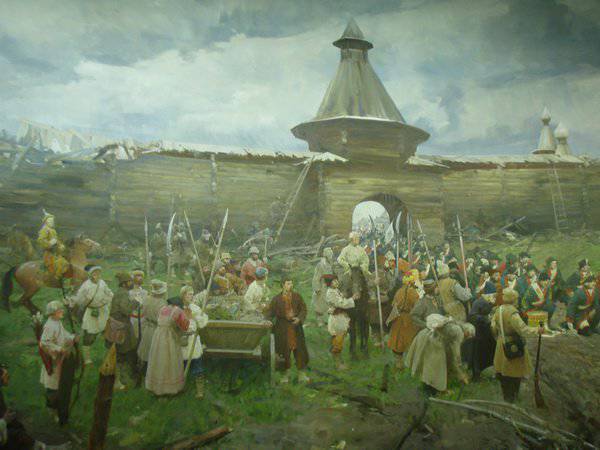
Fig. 2. Delivery of the fortress to Pugachev
The Orenburg Governor Reinsdorp ordered Brigadier Bilov with a detachment in 400 a man with 6 guns to move towards the rebels to help out Yaitsky town. However, a large detachment of rebels approached the fortress of Rassypnoy and on September 24 the garrison surrendered without a fight. September 27 Pugachev came to Tatischev fortress. A major fortification on the way to Orenburg had a garrison to 1000 warriors with 13 guns. In addition, there was a detachment of brigadier Bilov in the fortress. The first attack the besieged reflected. As part of the squad Bilova 150 fought Orenburg Cossacks centurion Timofey Padurov, who were sent to intercept the rebels who were moving around the fortress. To the surprise of the Tatishchevskaya garrison, the detachment of T. Padurov openly went over to the side of Pugachev. This undermined the strength of the defenders. The rebels set fire to the wooden walls, rushed to the attack and broke into the fortress. The soldiers almost did not resist, the Cossacks went over to the side of the impostor. They brutally assaulted the officers: Bilov was beheaded, commandant Colonel Elagin was skinned, the body of an obese officer was used to heal wounds, fat was cut off and wounds were lubricated. Elagin's wife was hacked up, the beautiful daughter Pugachev took him as a concubine, and later, after a good example of Stenka Razin, he killed along with his seven-year-old brother.
Unlike all other Orenburg Cossacks, under the fortress of Tatishchevskaya, there was perhaps only a single case of the voluntary transfer of the Orenburg Cossacks 150 to the side of the rebels. What made the centurion T. Padurov change the oath, surrender to the Cossacks of the thieves, serve the impostor and eventually end his life on the gallows? The centurion Timofey Padurov comes from a wealthy Cossack family. He had a large plot of land and a farm in the upper reaches of the river Sakmara. In 1766, he was elected to the Commission for the preparation of a new Code (set of laws) and has lived in St. Petersburg for several years and rotates in court circles. After the dissolution of the commission, he is appointed ataman of the Isatian Cossacks. In this position, he did not get along with the commandant of the Chelyabinsk fortress, Lieutenant Colonel Lazarev, and, starting in 1770, they bombarded Governor Reinsdorp with mutual denunciations and complaints. Not having achieved the truth, the centurion in the spring of 1772 of the year left Chelyaba for Orenburg to the linear service, where he stayed with the detachment until September of 1773 of the year. At the most crucial moment of the battle for the Tatischev fortress, he and the detachment went over to the side of the rebels, thereby helping to take the fortress and deal with its defenders. Apparently, Padurov did not forget his previous offenses, abhorred the alien German queen, her favorites and the magnificent surroundings that he observed in St. Petersburg. He truly believed in the high mission of Pugachev, with his help he wanted to overthrow the hated queen. It should be noted that the tsarist aspirations of the Cossacks, their attempts to put their Cossack tsar on the throne, repeatedly repeated in Russian history of the XVI-XVIII centuries. In fact, since the termination of the reign of the Rurik dynasty and with the beginning of the accession of the new clan of the Romanovs, "tsars and princes", contenders for the Moscow crown, were constantly promoted from the Cossack environment. Emelyan himself played well the role of the tsar, forcing all his comrades-in-arms, as well as the imperial officers and noblemen who were captured, to play along with him, swear allegiance, kiss his hand.
Dissenters immediately cruelly punished - executed, hung, tortured. These facts confirm the version of historians about the hard struggle of the Cossacks for their Cossack-Russian-Horde dynasty. The arrival of a clever, active and authoritative Cossack T. Padurov to the Pugachev camp was a great success. After all, this centurion knew the court life well, could tell ordinary people about the life and customs of the queen in vivid colors, debunk her depraved, lustful and thieving environment, all the legends and versions of Pugachev's royal origin give real appearance and real colors. Pugachev praised Padurov, made him colonel, appointed him to be with the "imperial person" and perform the duties of Secretary of State. Together with the former corporal Beloborodov and Khorunzhim of the Etkulsky stanitsa Shundeev, he conducted headquarters work and drew up "royal manifestos and decrees." But not only. With a small detachment of Cossacks, he went to meet the punitive detachment of Colonel Chernyshov, who was lost in the steppe. Having shown him his Golden Deputy sign, he gained confidence in the colonel and led his detachment to the very center of the rebel camp. Surrounded by soldiers and Cossacks threw down their guns and surrendered, 30 officers were hanged. A large detachment of Major-General V.A. was sent to defeat the rebels to Orenburg. Kara, who was appointed Commander-in-Chief, just over 1500 soldiers with 5 guns. When the detachment was a hundred equestrian Bashkir batyr Salavat Yulaev. The Pugachev troops surrounded a detachment of government troops near the village of Yuzeevka. At the decisive moment of the battle, the Bashkirs went over to the side of the rebels, which decided the outcome of the battle. Part of the soldiers joined the ranks of the rebels, some were killed. Pugachev granted Yulaev the rank of colonel, from that moment the Bashkirs took an active part in the uprising. To attract them, Pugachev threw populist slogans into the national masses: about expelling the Russians from Bashkiria, about destroying all the fortresses and factories, about transferring all the lands into the hands of the Bashkir people. These were false, divorced from the life of the promise, because it is impossible to turn the movement of progress backwards, but they came to the soul of the indigenous population. The approach of the new Cossack, Bashkir and workers detachments near Orenburg strengthened the army of Pugachev. During the six-month siege of Orenburg, the leaders of the uprising paid special attention to the training of troops. Being an experienced combat officer, the tireless leader taught his militiamen in military affairs. The army of Pugachev, like the regular one, was divided into regiments, companies and hundreds. Three types of troops were formed: infantry, artillery and cavalry. True, only Cossacks, ordinary people, Bashkirs and peasants were armed with anything to do with. Near Orenburg, the rebel army grew to 30 thousands of people with 100 guns with 600 gunners. At the same time, Pugachev repaired a trial and punishment of prisoners and spilled rivers of blood.
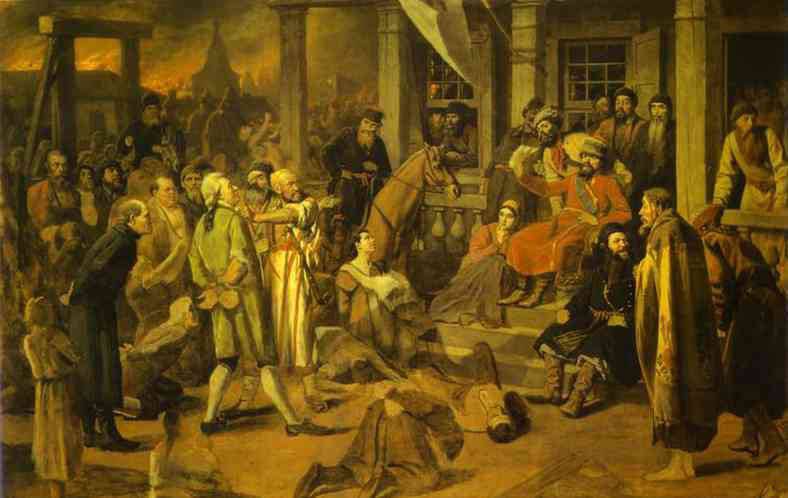
Fig. 3. Pugachev Court
But all the attacks on the capture of Orenburg were repulsed with heavy losses for the besiegers. Orenburg at the time was a first-class fortress with 10 bastions. In the ranks of the defenders were 3000 well-trained soldiers and Cossacks of the Separate Orenburg Corps, 70 guns fired from the walls. The defeated General Kar fled to Moscow and caused a great panic there. Anxiety swept Petersburg. Catherine demanded an early conclusion of peace with the Turks, and appointed a new commander of the energetic and talented General A.I. Bibikova, and for the head Pugacheva established the award in 10 thousand rubles. But the long-sighted and intelligent General Bibikov said to the queen: "Not Pugachev is important, it is important that general indignation ...". At the end of 1773, the rebels approached Ufa, but all attempts to take the impregnable fortress were successfully repulsed. Colonel Ivan Gryaznov was sent to Isetskaya province to capture Chelyabinsk. On the way, he captured fortresses, outposts, and stanitsa; Cossacks and soldiers of the Sterlitamak landing stage, Tabynsky town, the Bogoyavlensky plant, and the villages of Kundrava, Koelskaya, Verkhneuvelskaya, Chebarkul and other settlements joined him. Pugachev Colonel detachment grew to 6 thousand people. The rebels moved to the fortress of Chelyabinsk. Voivod of the Isset Province A. AP Verevkin took decisive measures to strengthen the fortress. In December 1773 of the year he ordered "temporary Cossacks" to be assembled in the 1300 district and Chelyaba’s garrison grew to 2000 people with 18 implements. But many of her defenders sympathized with the rebels and 5 in January 1774, a rebellion broke out in the fortress. He was headed by ataman of the Chelyabinsk Cossacks Ivan Urzhumtsev and cornet Nahum Nevzorov. The Cossacks, led by Nevzorov, captured the guns standing near the voivodship house and opened fire on the soldiers of the garrison. Cossacks broke into the house of the governor and inflicted cruel reprisals on him, beating him to a pulp. But fascinated by the massacre of hated officers, the rebels left the guns without proper supervision. Lieutenant Pushkarev with the Tobolsk Company and Gunners repulsed them and opened fire on the rebels. In the clash, the ataman Urzhumtsev was killed, and Nevzorov and the Cossacks left the city. On January 8, Ivan Gryaznov approached the fortress with the troops and stormed it twice, but the garrison bravely and skillfully held up the defenses. From attacking the artillery serfs suffered great losses. Reinforcement of the seconds-major Fadeev and part of the Siberian Corps of General Dekolong broke through to the besieged. Gryaznov lifted the siege and went to Chebarkul, but received reinforcements again occupied the village of Pershino near Chelyabinsk. February 1 in the area of Pershino, the battle of the Decolong squad with the rebels took place. Failing to succeed, government forces retreated to the fortress, and February 8 left it and retreated to Shadrinsk. The uprising spread, a vast territory was engulfed in the devouring fire of a fratricidal war. But many fortresses stubbornly did not surrender. The garrison of the Yaik fortress, not agreeing to any promises of Pugachev, continued to resist. The rebel commanders decided that if the fortress was taken, they would hang not only the officers, but also their families. The places where this or that person will hang were marked. There were both the wife and the five-year-old son of Captain Krylov, the future fabulist Ivan Krylov. weapon. As part of the opposing troops were not only countrymen, neighbors, but also close relatives. The father went to the son, the brother to the brother. Old-timers of the Yaik Town told a characteristic scene. From the wall of the fortress, the younger brother shouted to his elder brother approaching him with a mob of insurgents: "My dear brother, do not come! I will kill you." And the brother from the stairs to him in reply: "I will give you, I will kill! Wait, I got on the shaft, I hope you have a forelock, you will not continue to frighten your older brother anymore." And the younger brother blurted out at him from food and the elder brother rolled into the ditch. The surname of the brothers, the Gorbunovs, is also preserved. On the rebellious territory reigned terrible confusion. Gangs of robbers-barantachs were activated. On a large scale, they practiced hijacking people from the border strip to captive nomads. By all means, the commanders of the government forces attempting to extinguish the Pugachev rebellion were often forced to get involved in fights with these predators along with the rebels. The commander of one of these detachments, Lieutenant G. Derzhavin, the future poet, upon learning that a gang of nomads had been rampant, raised up to six hundred peasants, many of whom sympathized with Pugachev, and with them and the team in 25 the hussars attacked a large detachment of Kirgiz-Kaysaks and freed up to eight hundred Russian prisoners. However, the released prisoners announced to the lieutenant that they also sympathize with Pugachev.
The prolonged siege of Orenburg and Yaitsky town allowed the royal governors to pull up to the city the large forces of the regular army and the noble militia of Kazan, Simbirsk, Penza, Sviyazhsk. March 22 rebels suffered a brutal defeat by government troops at the fortress Tatishchevskaya. The defeat affected many of them depressingly. Khorunzhiy Borodin tried to seize Pugachev and extradite him to the authorities, but failed. Pugachev Colonel Mussa Aliyev captured and betrayed the prominent rebel Khlopusha. On April 1, at the exit from Sakmara town to Yaitsky town, the many thousands army of Pugachev was attacked and defeated by the troops of General Golitsyn. Prominent leaders were captured: Timofey Myasnikov, Timofey Padurov, scribes Maxim Gorshkov and Andrei Tolkachev, thought clerk Ivan Pochitalin, chief judge Andrei Vitoshnov, treasurer Maxim Shigaev. Simultaneously with the defeat of the main forces of the rebels near Orenburg, Lieutenant Colonel Mikhelson with his hussars and carabinieri perpetrated a complete defeat of the rebels near Ufa. In April 1774, the commander of the tsarist forces, General Bibikov in Bugulma, was poisoned by a captive Polish confederate. New Glavcom Prince F.F. Shcherbatov concentrated large military forces and sought to attract indigenous people to fight the rebels. From the regular army, the rebels suffered new defeats.
After these defeats, Pugachev decided to move to Bashkiria, and from that moment began the most successful period of his war with the tsarist government. One by one, he occupied the factories, replenishing his army with workers, weapons and ammunition. After the assault and destruction of the Magnitnaya fortress (now Magnitogorsk), he gathered a meeting of Bashkir elders there, promised to return the lands and lands to them, destroy the fortifications of the Orenburg line, mines and factories, drive out all the Russians. Seeing the ruined fortress and the surrounding mines, the Bashkir foremen greeted with great joy the promises and the promises of “hope-sovereign” began to help him with bread and salt, fodder and supplies, people and horses. Pugachev gathered up to 11 thousands of rebel fighters with whom he moved along the Orenburg line, occupied, destroyed and burned fortresses. 20 May they stormed the most powerful Trinity fortress. But 21 May in front of the fortress appeared troops of the Siberian corps of General Dekolong. The rebels attacked them with all their might, but failed to withstand the powerful onslaught of the brave and loyal soldiers, flinch and ran, while losing up to 4 thousands killed, 9 guns and the whole train.
With the remnants of the army, Pugachev plundered the Nizhneuvelskoye, Kichiginskoe and Koelskoye fortifications, through Varlamov and Kundrava went to the Zlatoust plant. However, near the Kundravs, the rebels had a head-on battle with the detachment I.I. Michelson and suffered a new defeat. The Pugachevites broke away from the Michelson detachment, which also suffered great losses and refused to pursue, looted the Miass, Zlatoust and Satka factories and joined up with the detachment S. Yulaev. A young jigit poet with a detachment near 3000 man was active in the mining and industrial zone of the Southern Urals. He managed to seize several mining plants, Simsky, Yuryuzansky, Ust-Katavsky and others, destroyed and burned them. In total, during the uprising, 69 plants of the Urals underwent partial and complete destruction, 43 plants did not participate in the insurgent movement at all, the rest created self-defense detachments and defended their enterprises, or bought off insurgents. Therefore, in the 70 years of the XVIII century, industrial production throughout the Urals declined sharply. In June, 1774, the units of Pugachev and S. Yulaev merged and laid siege to the Wasp fortress. After a hard battle, the fortress surrendered, and Pugachev opened the way to Kazan, his army quickly replenished with volunteers. With 20 by thousands of insurgents, he attacked the city from four sides. July 12 rebels broke into the city, but the Kremlin survived. An indefatigable, energetic and skillful Michelson approached the city and a field battle unfolded around the city. Frustrated Pugachev people, numbering around 400 people, crossed over to the right bank of the Volga.
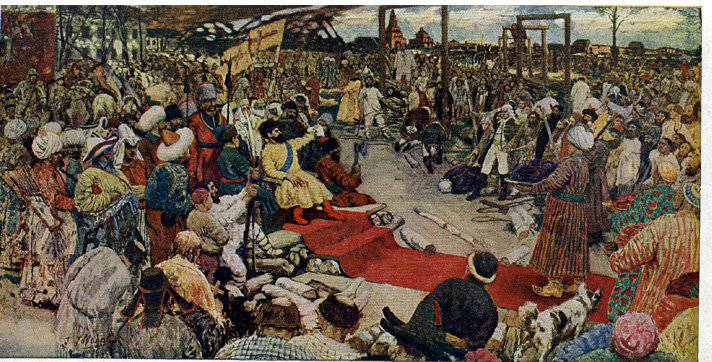
Fig. 5. Pugachev Court in Kazan
With the arrival of Pugachev in the Volga region, the third and last stage of his struggle began. Huge masses of peasants and Volga peoples stirred up and rose up in the struggle for imaginary and real freedom. The peasants, having received the Pugachev manifesto, killed the landlords, hung clerks, and burned down manor estates. Pugachev squad turned to the south, on the Don. The Volga cities surrendered to Pugachev without a fight, Alatyr, Saransk, Penza, Petrovsk, Saratov fell ... The offensive went fast. They took cities and villages, repaired the court and massacre of the gentlemen, freed prisoners, confiscated the property of the nobles, distributed bread to the hungry, took away weapons and ammunition, made volunteers to Cossacks and left, leaving behind fire and ashes. 21 August 1774, the rebels approached Tsaritsyn, the tireless Michelson followed on his heels. The storming of the fortress city failed. 24 August Michelson overtook Pugachev at Black Yar. The battle ended in total rout, 2 thousands of rebels were killed, 6 thousands were captured. With a detachment of two hundred rebels, the leader rode into the Trans-Volga steppes. But the days of the rebellious chieftain were numbered. The commander-in-chief of the troops operating against the rebels was appointed to the active and talented General Peter Panin, and in the southern sector all the forces subordinated A.V. Suvorov. And what is very important, Pugacheva did not support Don. About this circumstance should be said. On the Don, the Council of the Elders of 15-20 was ruled by a man and a chieftain. The circle gathered annually on January 1 and held elections for all the foremen, except for the chieftain. Tsar Peter I, with 1718, introduced the appointment of atamans (most often life-long). This strengthened the central power in the Cossack regions, but at the same time led to the abuse of this power. Under Anna Ioannovna, the glorious Cossack Danil Efremov was appointed Don Ataman, after some time he was appointed Military Ataman for life. But the government spoiled it, and when it began the uncontrolled domination of power and money. In 1755, for many achievements of the chieftain, he was granted the rank of major general, and in 1759, for his services in the Seven Years War, he was also a secret adviser with being in charge of the Empress, and his son Stepan Efremov was appointed ataman on the Don. Thus, the power on the Don by the highest order of the Empress Elizabeth Petrovna turned into hereditary and uncontrolled. From that time on, the Ataman family passed all moral boundaries into acquisitions, and in retaliation, an avalanche of complaints fell upon them. Even with 1764, according to the complaints of the Cossacks, Catherine demanded from Ataman Efremov a report on income, land and other possessions, his and foremen’s fisheries. The report did not satisfy her, and according to her instructions, the commission on the economic situation in the Don worked. But the commission worked not shaky, not roll. In 1766, a land survey was carried out and illegally occupied yurts were selected. In 1772, the commission finally gave an opinion on the abuse of ataman Stepan Efremov, he was arrested and sent to St. Petersburg. This case, on the eve of the Pugachev rebellion, took a political turn, especially since Ataman Stepan Efremov had personal services to the empress. In the 1762 year, being at the head of the light village (delegation) in St. Petersburg, he took part in the coup that raised Catherine to the throne and was awarded with a nominal weapon for it. The arrest and the investigation into the case of Ataman Efremov defused the situation on the Don and the Don Cossacks turned out to be practically not involved in the Pugachev rebellion. Moreover, the Don regiments took an active part in suppressing the rebellion, capturing Pugachev and reconciling the rebellious regions over the next few years.
The hopelessness of the further continuation of the insurgency was understood also by the prominent associates of Pugachev. His associates - Cossack Curd, Chumakov, Zheleznov, Fedulev and Burnov 12 of September seized and tied Pugachev. On September 15, he was taken to the town of Yaitsky, at the same time lieutenant-general A.V. Suvorov. During the interrogation, the future generalissimo was amazed at the common sense and military talents of the "villain". In a special cage, under a large escort, Suvorov himself escorted the robber to Moscow.
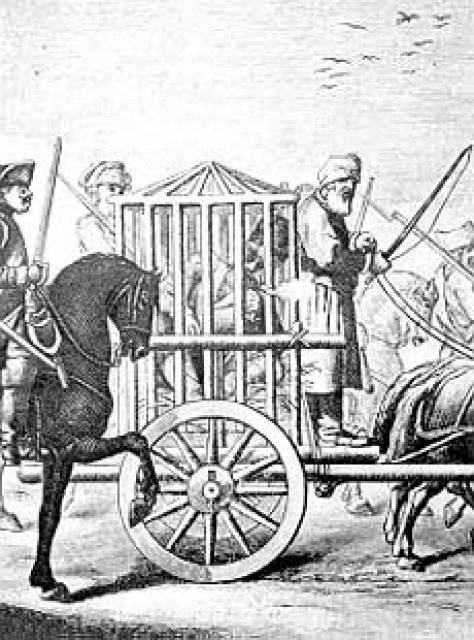
Fig. 6 Pugachev in a cage
9 January 1775, the court sentenced Pugachev to quartering, the empress replaced him with a penalty through beheading. On January 10, on Bolotnaya Square, Pugachev ascended the scaffold, bowed on four sides, quietly said: “Sorry, Orthodox people” and laid his poor head on the block, which the ax instantly cut off. Here, four of his closest associates were executed by hanging: Perfilyeva, Shigaev, Padurova and Tornova.
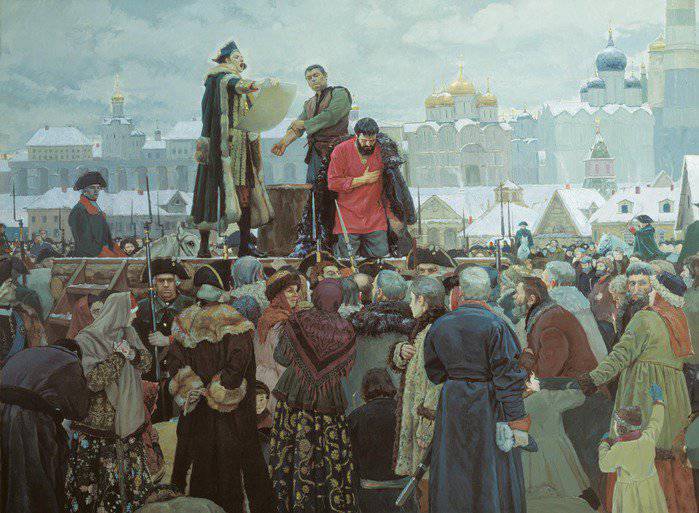
Fig. 7 Execution of Pugachev
Yet the uprising was not meaningless, as the great poet said. The ruling circles were able to verify the strength and rage of the people's anger and made serious concessions and relief. Breeders were instructed "to multiply payments for work by half and not to force work beyond the established standards." Religious persecution was stopped in the national areas, they allowed to build mosques and stopped taking taxes from them. But the vindictive Empress Catherine II, noting the loyalty of the Orenburg Cossacks, outraged Yaik. The empress wanted to abolish the Yaik army at all, but then, at the request of Potemkin, she forgave her. To bring the rebellion to oblivion, the army was renamed the Ural, the Yaik River to the Urals, the Yaitsky fortress to Uralsk, etc. Catherine II abolished the military circle and elective management. The choice of chieftains and foremen finally passed to the government. The troops took away all the guns and banned them from now on. The ban was lifted only after 140 years with the start of World War II. But Yaitsky army still lucky. Volga Cossacks, also involved in a riot, were resettled in the North Caucasus, and the Zaporizhian Sich was completely eliminated. After a riot of not less than ten years, the Ural and Orenburg Cossacks were armed only with cold weapons, squeaked and received ammunition only with the threat of clashes. The revenge of the winners was no less terrible than the bloody feats of the Pugachevites. Punitive detachments raged in the Volga region and in the Urals. Thousands of rebels: Cossacks, peasants, Russians, Bashkirs, Tartars, Chuvash were executed without any court, sometimes just at the whim of punitive. In Pushkin's papers about the history of the Pugachev rebellion, there is a note that Lieutenant Derzhavin ordered the two rebels to be hanged "out of poetic curiosity." However, the Cossacks, who remained loyal to the empress, were generously rewarded.
Thus, in the XVII-XVIII centuries, a type of Cossack was finally formed - a universal warrior, equally capable of participating in sea and river raids, fighting on land both in horse and on foot, knowing artillery, fortification, siege, mine and demolition . But the main type of hostilities before were sea and river raids. Most of the time, the Cossacks began to horseback later under Peter I, after the ban on going to sea in 1695. At its core, the Cossacks are a caste of warriors, kshatriyas (in India, a caste of warriors and kings), who for centuries defended the Orthodox faith and the Russian land. By the exploits of the Cossacks, Russia became a powerful empire: Yermak presented Ivan the Terrible with the Siberian Khanate. Siberian and Far Eastern lands along the rivers Ob, Yenisei, Lena, Amur, also Chukotka, Kamchatka, Central Asia, and the Caucasus were joined largely due to the military valor of the Cossacks. Cossack ataman (hetman) Bogdan Khmelnytsky reunited Ukraine with Russia. But the Cossacks often spoke out against the central government (their role in the Russian Troubles, in the uprisings of Razin, Bulavin and Pugachev is remarkable). Many and stubbornly Dnieper Cossacks rebelled in the Commonwealth. To a large extent, this was explained by the fact that the ancestors of the Cossacks were ideologically brought up in the Horde on the laws of Yasa of Genghis Khan, according to which only Chingizid could be the real king descendant of Genghis Khan. All other rulers, including Rurikovich, Gediminovich, Piast, Jagiellonian, Romanov and others, were not sufficiently legitimate in their eyes, were “not real kings”, and Cossacks were morally and physically allowed to participate in their overthrow, riots and other anti-government activities. And in the process of the collapse of the Horde, when hundreds of Chingizids, including Cossack sabers, were destroyed during the strife and power struggles, Chingizids also lost Cossack piety. One should not disregard the simple desire to "show off", take advantage of the weakness of power and take legitimate and rich trophies during the unrest. Papal ambassador to the Sich Father Pirling, who had worked hard and successfully to direct the militant fervor of the Cossacks on the lands of heretics Muscovites and Ottomans, wrote this in his memoirs: “The Cossacks wrote their history with a sword, and the battlefields left this feather their own bloody trail. For the Cossacks, it was customary to deliver the thrones to all kinds of applicants. In Moldova and Wallachia periodically resorted to their help. For the formidable freemen of Dnepr and Don it was completely indifferent, genuine or imaginary rights belong to the hero of the minute. For them it was important one thing - that their share of good production. Was it possible to compare the miserable Danube principalities with the limitless plains of the Russian land, full of fabulous wealth? ”
However, from the end of the 18th century until the October Revolution, the Cossacks unconditionally and diligently played the role of defenders of Russian statehood and the support of royal power, having received from revolutionaries even the nickname of "royal satrapov." By some miracle, an alien German queen and her outstanding grandees managed to drive into the violent Cossack head a steady idea that Catherine II and her descendants are “real” kings, and Russia is a real empire, in some places "abruptly" Horde. This metamorphosis in the consciousness of the Cossacks, which occurred at the end of the 18th century, is in fact Cossack historians and writers still little studied and studied. But there is an indisputable fact: from the end of the XVIII century and before the October Revolution, the Cossack riots disappeared like a hand, and the most bloody, long-lasting and famous Cossack riot in the history of Russia choked.
Materials used:
Mamonov V.F. and others. The history of the Cossacks of the Urals. Orenburg, Chelyabinsk, 1992.
Shibanov N.S. Orenburg Cossacks XVIII — XIX centuries. Chelyabinsk, 2003.
Gordeev A.A. History of the Cossacks.
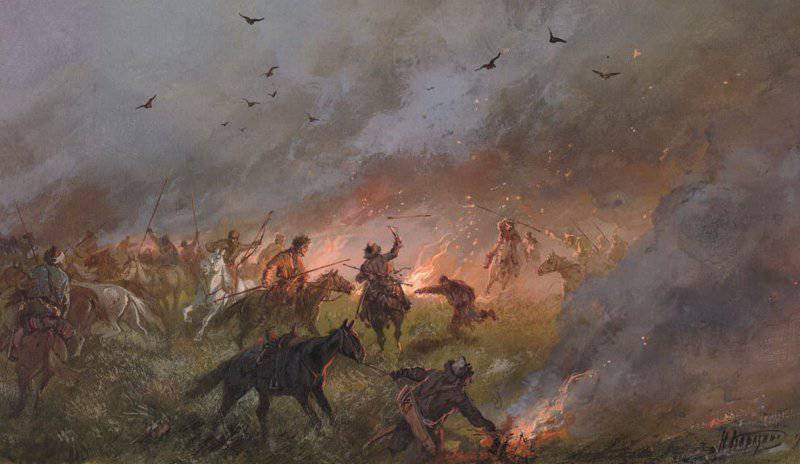
Information